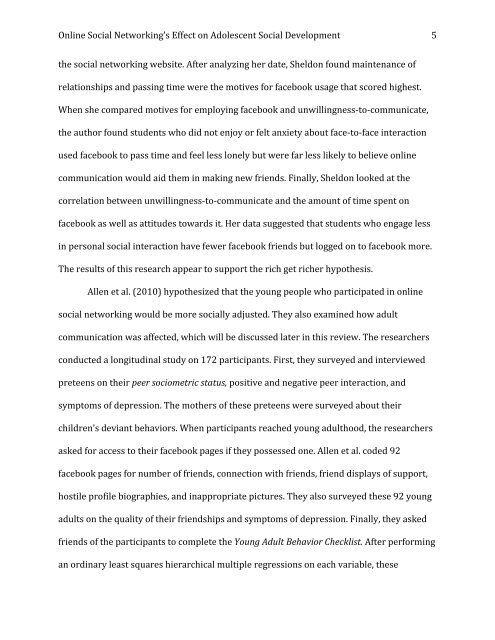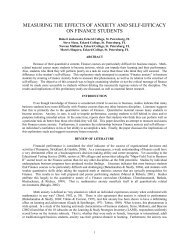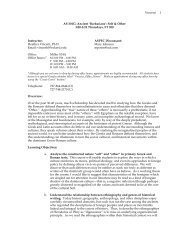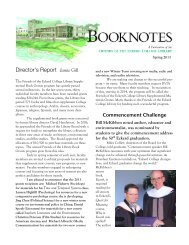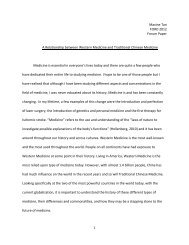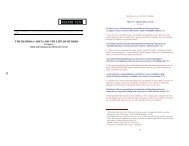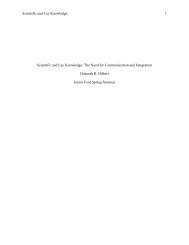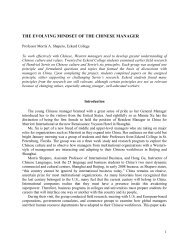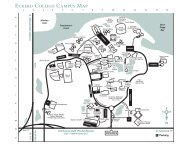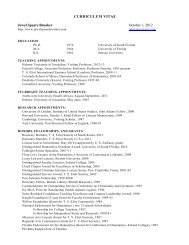Online Social Networking's Effect on Adolescent ... - Eckerd College
Online Social Networking's Effect on Adolescent ... - Eckerd College
Online Social Networking's Effect on Adolescent ... - Eckerd College
Create successful ePaper yourself
Turn your PDF publications into a flip-book with our unique Google optimized e-Paper software.
<str<strong>on</strong>g>Online</str<strong>on</strong>g> <str<strong>on</strong>g>Social</str<strong>on</strong>g> Networking’s <str<strong>on</strong>g>Effect</str<strong>on</strong>g> <strong>on</strong> <strong>Adolescent</strong> <str<strong>on</strong>g>Social</str<strong>on</strong>g> Development<br />
the social networking website. After analyzing her date, Sheld<strong>on</strong> found maintenance of<br />
relati<strong>on</strong>ships and passing time were the motives for facebook usage that scored highest.<br />
When she compared motives for employing facebook and unwillingness‐to‐communicate,<br />
the author found students who did not enjoy or felt anxiety about face‐to‐face interacti<strong>on</strong><br />
used facebook to pass time and feel less l<strong>on</strong>ely but were far less likely to believe <strong>on</strong>line<br />
communicati<strong>on</strong> would aid them in making new friends. Finally, Sheld<strong>on</strong> looked at the<br />
correlati<strong>on</strong> between unwillingness‐to‐communicate and the amount of time spent <strong>on</strong><br />
facebook as well as attitudes towards it. Her data suggested that students who engage less<br />
in pers<strong>on</strong>al social interacti<strong>on</strong> have fewer facebook friends but logged <strong>on</strong> to facebook more.<br />
The results<br />
of this research appear to support the rich get richer hypothesis.<br />
Allen et al. (2010) hypothesized that the young people who participated in <strong>on</strong>line<br />
social networking would be more socially adjusted. They also examined how adult<br />
communicati<strong>on</strong> was affected, which will be discussed later in this review. The researchers<br />
c<strong>on</strong>ducted a l<strong>on</strong>gitudinal study <strong>on</strong> 172 participants. First, they surveyed and interviewed<br />
preteens <strong>on</strong> their peer sociometric status, positive and negative peer interacti<strong>on</strong>, and<br />
symptoms of depressi<strong>on</strong>. The mothers of these preteens were surveyed about their<br />
children’s deviant behaviors. When participants reached young adulthood, the researchers<br />
asked for access to their facebook pages if they possessed <strong>on</strong>e. Allen et al. coded 92<br />
facebook pages for number of friends, c<strong>on</strong>necti<strong>on</strong> with friends, friend displays of support,<br />
hostile profile biographies, and inappropriate pictures. They also surveyed these 92 young<br />
adults <strong>on</strong> the quality of their friendships and symptoms of depressi<strong>on</strong>. Finally, they asked<br />
friends of the participants to complete the Young Adult Behavior Checklist. After performing<br />
an ordinary least squares hierarchical multiple regressi<strong>on</strong>s <strong>on</strong> each variable, these<br />
5


